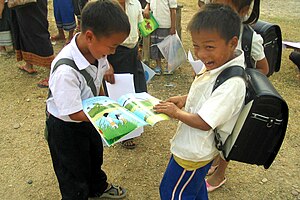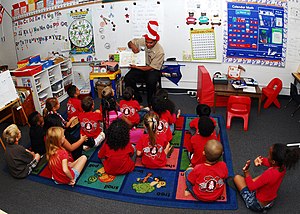Look at your shelves. How many books are there? Have you read them all? One’s cover is hardly hanging onto the spine. That one, you cannot read the spine because it is broken in so many places. This one’s so dogeared, it will not lie flat. What of these over here? Some, so pristine, while others well-loved. Achoo! Dust often?
Dust?
Are you really going to read that? When was the last time you read it? Oh, I see. You were four, and your mother read it to you. Hmm. (Do you hear the “starving children in China” speech revving its engine?)
- More than 60% of low income families own no books.
- Over 40% of the lowest literacy rate live in poverty.
- Only 4% of the highest literacy rate live in poverty.
- Low income neighborhoods have ONE age-appropriate book per 300 children.
- Middle income neighborhoods have 13 books per child.
Low income neighborhoods have the lowest (all the way to no) access to bookstores and have lowered access to smaller libraries, meaning fewer books. Nationwide, schools are cutting budgets, and libraries are often the first to suffer those budget cuts. This means no new books.
Love it?
How did you discover you loved to read? Someone was reading to you before you learned to do it for yourself. Nearly 60% of children increase their interest in reading simply by having books at an early age. The broader the range of reading material in the home, the more creative and proficient in reading the children are.
How much easier is it to learn something when you have read about something similar…or the exact same thing? No, you did not go to a one-room school house in the snow, uphill both ways. Need to bring it closer so you can understand?
The last time you went to a foreign place (country or county), you took a few minutes to read about it. You found out where you were going, what was of interest, where to find someone to help you, something to entertain you and/or when an event (whose history you had studied) was taking place. This is called continuing education.
It is all fiction.
From the pages of great works of fiction does imagination spring. Whether we are talking about the accepted classics or the author who has only one title in the repertoire, passing the baton is the responsible thing to do.
Consequences
Each of us has one book which influenced us more than all the rest. Rarely do we meet someone who has the exact same book. How good would it make you feel to pass along a book which would inspire someone to create a new classic or wins a Pulitzer? Or give one to someone who contacts the one-book author begging for a sequel?
Or pass one on to someone who becomes an inventor based on something they read in the sci-fi book you kept in your bathroom for a month? Or give one to someone who becomes a librarian or historian? Or pass one on to someone who becomes a photographer who captures the photograph of the century?
Literacy depends on access to books. You have to have something to read to learn how to read. You never learn to change oil without access to a car, how could reading be any different?
Do Something
1. Get some boxes. Stand in front of your bookshelf. Pull off books which:
- You will never read again.
- You have had more than two years, but still have not read.
- You have not needed for reference in more than two years.
- You have read at least three times.
2. Pack the boxes. Group books by genre, author or subject.
3. Call to see who needs books. Your local library always needs books. Since they may take duplicate titles, call in advance to be sure. But before you call there, begin with these:
- Nursing home or assisted living facility
- Veteran’s retirement agency
- Oncology hospital unit (chemotherapy)
- Blood donation facility
- Dialysis clinic
- Foster home agency
- Special education agency (early intervention for children in need)
- Children’s organization (scouting, citizenship)
- School
Remember, many of these will also benefit from magazines. If the magazine is more than three months old, it is cluttering your home. Donate it to someone who has not yet read it.
4. Deliver the books.
Seeing the joy you bring someone is all the reward you will ever need. A tax write-off is merely a money-saving bonus. Clearing some clutter from your home is good for your allergen-prone sinuses.
I don’t have any.
Are all of your books on your e-reader? You can still help raise literacy rates.
- Buy some children’s books to donate.
- Contact and donate to a non-profit organization who takes donations to buy and deliver books.
- Sponsor a Rock’n’Read program at a local elementary school.
- Buy a magazine subscription for one of the facilities above.
- Convince your friends to help you by donating their books and magazines or money.
- Volunteer to deliver books.
- Read to children at your local libraries and schools.
Give the gift of reading.
You can give the gift of how-to or adventure or imagination or history to a child of any age. Just imagine what it would be like if you could not read this.
~~~~~~~~~~
- Where do you donate your books?
- When was the last time you dusted books you no longer read?
- What agencies are in your area providing book services?
- When was the last time you spoke with a librarian?
- What book most influenced your love of reading or self-realization?
~~~~~~~~~~
Will you make a difference in a child’s life by giving a book?







ansuyo
/ February 10, 2012I donate to schools where I can. I am slowly passing on my best loved to my kids and grad kids. Giving up the books is HARD!
Red
/ February 10, 2012For me, once I accepted the two and three year rules, it got a lot easier.